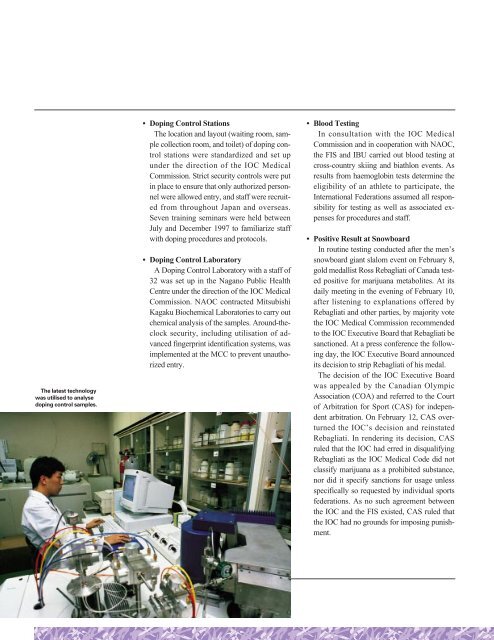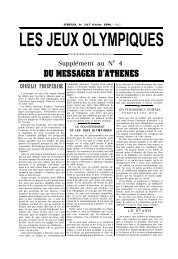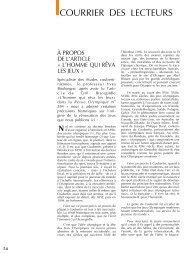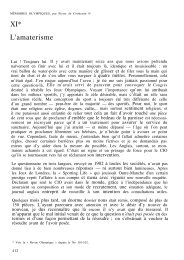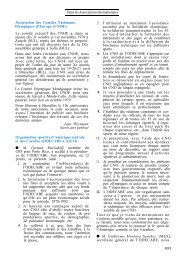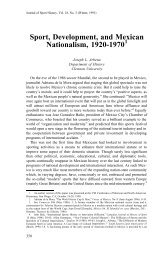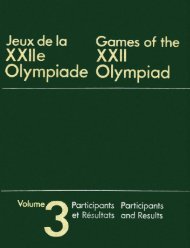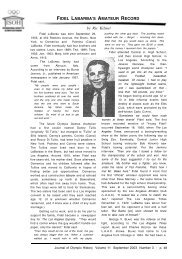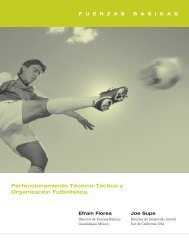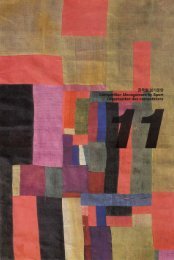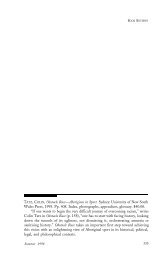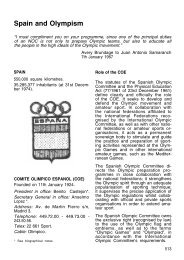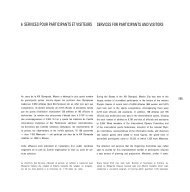107th IOC Session - LA84 Foundation
107th IOC Session - LA84 Foundation
107th IOC Session - LA84 Foundation
Create successful ePaper yourself
Turn your PDF publications into a flip-book with our unique Google optimized e-Paper software.
The latest technology<br />
was utilised to analyse<br />
doping control samples.<br />
• Doping Control Stations<br />
The location and layout (waiting room, sample<br />
collection room, and toilet) of doping control<br />
stations were standardized and set up<br />
under the direction of the <strong>IOC</strong> Medical<br />
Commission. Strict security controls were put<br />
in place to ensure that only authorized personnel<br />
were allowed entry, and staff were recruited<br />
from throughout Japan and overseas.<br />
Seven training seminars were held between<br />
July and December 1997 to familiarize staff<br />
with doping procedures and protocols.<br />
• Doping Control Laboratory<br />
A Doping Control Laboratory with a staff of<br />
32 was set up in the Nagano Public Health<br />
Centre under the direction of the <strong>IOC</strong> Medical<br />
Commission. NAOC contracted Mitsubishi<br />
Kagaku Biochemical Laboratories to carry out<br />
chemical analysis of the samples. Around-theclock<br />
security, including utilisation of advanced<br />
fingerprint identification systems, was<br />
implemented at the MCC to prevent unauthorized<br />
entry.<br />
• Blood Testing<br />
In consultation with the <strong>IOC</strong> Medical<br />
Commission and in cooperation with NAOC,<br />
the FIS and IBU carried out blood testing at<br />
cross-country skiing and biathlon events. As<br />
results from haemoglobin tests determine the<br />
eligibility of an athlete to participate, the<br />
International Federations assumed all responsibility<br />
for testing as well as associated expenses<br />
for procedures and staff.<br />
• Positive Result at Snowboard<br />
In routine testing conducted after the men’s<br />
snowboard giant slalom event on February 8,<br />
gold medallist Ross Rebagliati of Canada tested<br />
positive for marijuana metabolites. At its<br />
daily meeting in the evening of February 10,<br />
after listening to explanations offered by<br />
Rebagliati and other parties, by majority vote<br />
the <strong>IOC</strong> Medical Commission recommended<br />
to the <strong>IOC</strong> Executive Board that Rebagliati be<br />
sanctioned. At a press conference the following<br />
day, the <strong>IOC</strong> Executive Board announced<br />
its decision to strip Rebagliati of his medal.<br />
The decision of the <strong>IOC</strong> Executive Board<br />
was appealed by the Canadian Olympic<br />
Association (COA) and referred to the Court<br />
of Arbitration for Sport (CAS) for independent<br />
arbitration. On February 12, CAS overturned<br />
the <strong>IOC</strong>’s decision and reinstated<br />
Rebagliati. In rendering its decision, CAS<br />
ruled that the <strong>IOC</strong> had erred in disqualifying<br />
Rebagliati as the <strong>IOC</strong> Medical Code did not<br />
classify marijuana as a prohibited substance,<br />
nor did it specify sanctions for usage unless<br />
specifically so requested by individual sports<br />
federations. As no such agreement between<br />
the <strong>IOC</strong> and the FIS existed, CAS ruled that<br />
the <strong>IOC</strong> had no grounds for imposing punishment.


